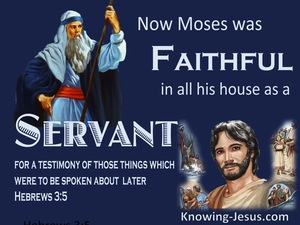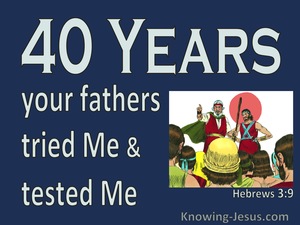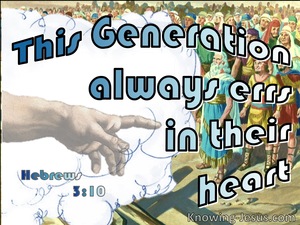◄ Hebrews 3 Devotional Commentary ►
Hebrews 3:1
Can there ever be a heart that truly, honestly, and carefully reflects upon Lord Jesus Christ, that does not cover their face with a mantle and recognise they are treading on holy ground? Can anyone who carefully considers this heavenly Man Whose person, parentage, wisdom, and worth, surpasses human understanding, ever remain immune to the truth?
He was Son of the most-high God. He was Kinsman-Redeemer of humankind, and He came read more...
Hebrews 3:2
As maturing believers, we are to contemplate Jesus and consider what He has done for us. We who have a heavenly calling are exhorted to set our thoughts upon the Lord Jesus because it is His name, His Person, and His sacrificial work that we confess in our hearts and proclaim with our mouths for the salvation of the soul.
Jesus is our great High Priest and the one we acknowledge by faith as our God and Saviour, and we are to pay read more...
Hebrews 3:3
The supremacy and superiority of Christ over Israel's greatest leaders, mightiest heroes, and revered patriarchs, prophets, priests, and kings, cannot be emphasised more exhaustively than in these early chapters of Hebrews. No wonder the warning in this book is NOT to revert back into the old ways under the Law.
The honour and glory that is due to Jesus is infinitely superior to that demanded by Abraham, read more...
Hebrews 3:4
The infinite and indisputable supremacy of the Lord Jesus is the singular focus of the first few chapters of Hebrews. Christ has been identified as superior to the prophets and to all ranks of angelic beings. He is heralded as superior in Person and rank to Moses and Joshua... to Aaron and the priesthood.
The incomparable offering of Christ as the sin sacrifice for the world, is similarly of infinitely superior worth than the read more...
Hebrews 3:5
Faithfulness is a quality to which we are all called; faithfulness in our earthly duties and faithfulness to our Heavenly Father. Moses is lifted up in the book of Hebrews as a prime example of faithfulness, for we read: "Now Moses was faithful in all his house as a servant, and the Lord used Moses as a testimony of those things which were to be spoken of later."
Just as the Law is a schoolmaster which steadfastly points us to Christ and His read more...
Hebrews 3:6
Hebrews provided Jewish Christians in the early Church a brilliant understanding that Israel's Old Covenant had been superseded by a New and better Covenant, cut at Calvary through the shed blood of the Lord Jesus.
They came to understand that in former days, God spoke through prophets like Moses, David, Elijah, Isaiah, and Malachi. But in these last days, His Word of truth has been given directly through Jesus, the God-Man and read more...
Hebrews 3:7
How clearly the writer to the Hebrews reminds us to consistently and continuously keep our focus on Jesus, Who is the both the Apostle and the High Priest of our Christian faith and our heavenly calling.
Christ's faithfulness in carrying out His Heavenly Father's business is unsurpassed by great prophets like Moses, unmatched by read more...
Hebrews 3:8
At the beginning of Hebrews, we are informed that God has spoken in these last days through His Son, and throughout the epistle, there are quotations from the Word. When God speaks, His children should listen, take note, learn the lesson He is teaching, hide his instruction in their hearts, and apply His truth in their lives.
In this verse, God is warning us to learn from Israel's disobedience and exhorting us not to repeat their read more...
Hebrews 3:9
The Lord sanctioned Israel to wander 40-years in the wilderness because they tried His patience and tested His forbearance with their lack of faith. Because of unbelief and incessant murmurings against God, they were disciplined in the wilderness instead of entering His promised rest.
Although initially written to Jewish Christians in the fledgling years of the read more...
Hebrews 3:10
Just as Matthew's target audience was to the lost sheep of the house of Israel, so the book of Hebrews was initially directed towards Hebrew Christians in the early Church who found the transition from the pre-Cross dispensation of Law to the post-Cross dispensation of grace difficult. As a result, both writers included many Old Testament quotes to establish the truth they were sharing.
Matthew's goal was to identify Jesus as the read more...
Hebrews 3:11
Israel's wandering in the wilderness was the result of unbelief and rebellion. God had brought them out of Egypt and was ready to give them great victory in the Promised Land, but disobedience caused their entrance into the land of promise to be delayed for forty years. Instead of trusting God to fight the giants in the land, their faith in God failed, and He swore in His wrath they would not enter His promised rest.
This event is read more...
Hebrews 3:12
Although miraculously redeemed from Egypt, Israel doubted God's ability to bring them into the Promised Land, and unbelief caused them to miss the many blessing God planned for them. They were saved that first Passover night, but lived the rest of their life in defeat.
They believed God's Word when Moses challenged Pharoah: "Let my people go." They believed Him when given instructions for the first Passover meal. read more...
Hebrews 3:14
Much of the book of Hebrews admonishes Christians to learn from Israel's mistakes. We are warned not to fall into the same attitude of rebellion and unbelief. Despite being redeemed from Egyptian slavery, Israel murmured against the Lord! They remained in the desert for 40 years and did not enter their promised rest because of unbelief and a hardening of their hearts towards the God of their read more...
Hebrews 3:18
There is an oft-repeated adage that the Old (Testament) is in the New revealed, and the New is in the Old concealed. But although there is an element of truth in this statement, it is not entirely correct.
Although a believer can often see Old Testament types, metaphors, promises, and prophecies being fulfilled in the Bible and opened to their understanding, as we grow in the Christian faith, the mysteries of which Paul spoke so read more...













